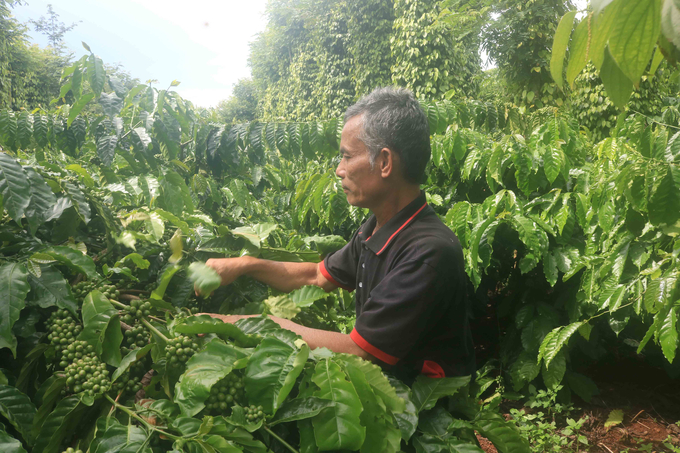June 2, 2025 | 09:43 GMT +7
June 2, 2025 | 09:43 GMT +7
Hotline: 0913.378.918
June 2, 2025 | 09:43 GMT +7
Hotline: 0913.378.918

Ms. Nguyen Thi Trang shared at a meeting with 50 outstanding farmers from the NESCAFÉ Plan program. Photo: Son Trang.
Among the 50 outstanding farmers from the NESCAFÉ Plan program who were recently invited by Nestlé Vietnam to visit the Nestlé Tri An Factory (Bien Hoa, Dong Nai), Ms. Nguyen Thi Trang, from Thon 4, Nhan Co Commune, Dak R'lap District, Dak Nong Province, stood out as one of the most notable participants due to her relatively young age.
Born in the early 1990s, Ms. Trang is considered part of the younger generation of coffee farmers, especially when compared to the average age of most coffee growers.
Before returning to her hometown, Ms. Trang lived in Ho Chi Minh City, where she completed her studies and worked for several years. However, at the age of 26, she made the decision to go back to her roots and continue her family’s coffee farming tradition. As a young person, she is deeply concerned with how to develop her family’s coffee farm in a way that is sustainable, ensuring long-term economic benefits.
After being introduced to regenerative agriculture through the NESCAFÉ Plan, Ms. Trang made the decision to join the program and formally commit to sustainable coffee production. With her solid knowledge base, strong willingness to learn, and dedication to following the correct processes, she quickly became one of the most outstanding examples of sustainable coffee farmers in Nhan Co Commune. Despite her relatively young age compared to the other coffee farmers in the area, she earned the trust of her peers, leading to her appointment as the leader of a group of sustainable coffee farmers in Nhan Co, which now includes 95 members.
Thanks to her successful implementation of sustainable coffee farming methods, Ms. Trang has been able to significantly improve her family's financial situation since she joined the NESCAFÉ Plan. Over the years, her hard work and dedication to the program have allowed her to accumulate enough capital to purchase an additional hectare of land, which has greatly expanded her family’s coffee farming operations. Previously, her family’s coffee farm consisted of only a few thousand square meters, but now it has grown considerably, increasing the area dedicated to coffee cultivation.
Recognizing that sustainable coffee production is the right path for both economic and environmental benefits, Ms. Trang has taken it upon herself to actively promote and inspire other members of her group to adopt these practices. As the leader, she has been particularly focused on encouraging female members of the group to embrace sustainable coffee farming. She encourages them to work together towards improving the quality of Vietnamese coffee, contributing to raising the value of the country's coffee beans on the global market.

A coffee farm practicing regenerative agriculture in Ea Ktur Commune, Cu Kuin District, Dak Lak Province. Photo: Son Trang.
At a gathering of the 50 most outstanding farmers from the NESCAFÉ Plan program, Ms. Trang shared her experience and insights after working in sustainable agriculture for some time. She explained that she had come to realize that farming not only brings economic value but also holds significant importance in terms of its social, environmental, and spiritual benefits. These factors, she emphasized, are vital in attracting young people who are forward-thinking, value sustainability, and are eager to contribute to long-term agricultural development.
In addition to Ms. Nguyen Thi Trang, many other young people in the Central Highlands are following a similar path by participating in the NESCAFÉ Plan and adopting sustainable coffee farming practices. One notable example is the story of Mr. Y Hung Bya, a young farmer from Buon Pu Hue, Ea Ktur Commune, Cu Kuin District, Dak Lak Province. Mr. Y Hung Bya had previously worked abroad, but after gaining valuable experience, he decided to return to his roots and take charge of his family’s coffee farm. He chose to develop the farm according to the regenerative agricultural model promoted by the NESCAFÉ Plan.
Mr. Khuat Quang Hung, the Director of External Relations and Communications at Nestlé Vietnam, emphasized that sustainable coffee production is not only beneficial in terms of economic and environmental impacts but is also bringing important social value to communities. He highlighted that in recent years, the majority of coffee farmers have been older due to a lack of younger generations entering the profession.
In recent years, the majority of coffee farmers have been older due to a lack of younger generations entering the profession. This trend is largely driven by the migration of rural youth to cities and industrial zones in search of higher-paying jobs and better living conditions. However, Mr. Hung noted that the NESCAFÉ Plan’s focus on sustainable coffee production has begun to draw the attention of a growing number of young people from rural areas. For many, this is an opportunity to stay in their hometowns or, in some cases, return from the cities to participate in coffee farming in a more sustainable and future-oriented way.
In addition to this, the tangible benefits of regenerative agriculture and sustainable coffee practices are having a positive impact on farmers' trust in the future of coffee production. As a result, this has helped them remain committed to this crop.
Translated by Phuong Linh

(VAN) Seafood by-products are opening a new path, combining green growth and technological innovation to enhance the industry's value.

(VAN) Mr. Nguyen Thanh Cong, Vice Chairman of the Son La Provincial People's Committee, reflects on Son La’s journey from barren hills to fruitful orchards after a decade of hard work.

(VAN) FAO’s Director-General addresses the 5th Baghdad International Water Conference.
/2025/05/26/1716-4-nongnghiep-191706.jpg)
(VAN) Chain linkages, technological innovation, and raw material zoning are three strategic pillars for the coconut industry to strongly develop and elevate its position on the global agricultural map.
![Advanced mariculture – an inevitable trend: [4] Accompanied by scientists](https://t.ex-cdn.com/nongnghiepmoitruong.vn/608w/files/sohk/2025/05/13/1941-pgsts-vo-van-nha-140958_717.jpg)
(VAN) According to Assoc. Prof. Dr. Vo Van Nha, Director of the RIA III, the development of advanced offshore mariculture is no longer an option but an essential path for Vietnam’s fisheries sector.

(VAN) Vietnam is intensifying the development of mollusk farming areas that meet international standards, aiming for sustainable growth and enhancing its export position in the global seafood market.
![Advanced mariculture – an inevitable trend: [3] Policy-driven momentum](https://t.ex-cdn.com/nongnghiepmoitruong.vn/608w/files/doanhtq/2025/05/21/0104-0616-0348-nuoi-bien-170339_789.jpg)
(VAN) To ensure the success of offshore mariculture that uses advanced technologies, it is essential to establish supportive policies that inspire both individuals and enterprises to invest with confidence.